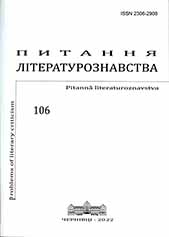Ментори та Інґеборґ Бахман: письменницька майстерня успішного старту
Mentors and Ingeborg Bachman: A Writing Workshop for a Successful Start
Author(s): Yulia IsapchukSubject(s): Studies of Literature, Austrian Literature
Published by: Чернівецький національний університет імені Юрія Федьковича
Keywords: Ingeborg Bachman; mentor; writing workshop; debut; success;
Summary/Abstract: The article studies the image of a mentor for the development of a novice author on the example of the work of the successful Austrian writer Ingeborg Bachmann (1926–1973). The role of a tutor is analysed from her first texts to the status of a Viennese intellectual in the middle of the 20th century. The direct influence of older writers and artists from the same generation on the formation of her author’s style is gradually investigated. The figure of the first mentor, the Carinthian writer and teacher Joseph Friedrich Perkonig is emphasized in the example of her early story “The Cross of Hondich” („Das Honditschkreuz”, 1943/1944) and “Letters to Felician” („Briefe an Felician”, 1946). The figure of the second mentor, the Austrian repatriate writer Hans Weigel and his writing workshop (“Group 50”) is examined. Attention is focused on H. Weigel’s autobiographical novel “Unfinished Symphony” („Unvollendete Symphonie”, 1951) and I. Bachman’s first novel “Nameless City” („Stadt ohne Namen”) on his consulting during 1947–1952. Attention is turned to the I. Bachman’s acquaintance with Paul Celan in Vienna, started the artistic dialogue between two young authors: the collection of poems “Deferred Time” („Die gestundete Zeit”, 1953) and “Invocation to the Big Dipper” („Anrufung des großen Bären”, 1956) by I. Bachman and “Poppy and Memory” („Mohn und Gedächtnis”, 1952) by P. Celan. The parallel correspondence of the author with H. Weigel and P. Celan is also compared. We study the role of Hans Werner Richter, the leader of the prominent “Group 47”, whose prize (1953) finally convinced the young author to become a professional writer. Communication with the German composer Hans Werner Henze is stressed as a coexistence of “twins in spirit” and successful intermedial tandem.
Journal: Питання літературознавства
- Issue Year: 2022
- Issue No: 106
- Page Range: 64-83
- Page Count: 20
- Language: Ukrainian

